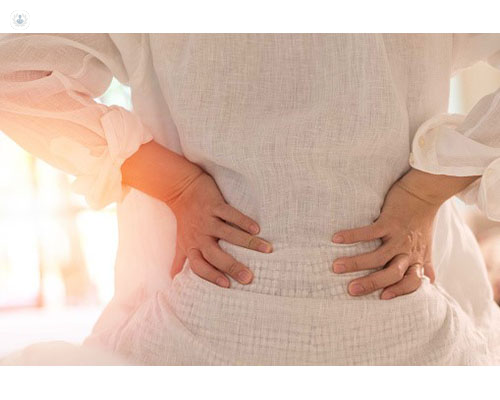Understanding kidney stones - Treatment options, natural remedies, and lifestyle changes
Autore:In his latest online Mr Rono Mukherjee gives us his expert insight into kidney stones. He explains the most common effective treatment, what they are made of, natural remedies and the different treatment options.

What are the most common most effective treatment options for a kidney stone?
The most effective way to deal with kidney stones is through prevention. If you wish to avoid kidney stones or prevent their growth, the primary advice I would give is to make dietary adjustments.
The key change involves increasing your daily clear fluid intake to two and a half litres, which may consist of water with a hint of lemon or lime juice since citric acid helps in preventing kidney stones. Additionally, it is essential to steer clear of dehydration, caused by beverages like tea and coffee, which can lead to water loss.
By reducing your consumption of tea and coffee and ensuring you drink enough water, aiming for two and a half litres a day, you can maintain proper hydration. You can gauge your hydration level by the colour of your urine—light and clear urine indicates adequate hydration, while darker urine may indicate insufficient fluid intake. You can use measuring bottles to keep track of your daily fluid intake.
Are there any lifestyle changes that can prevent the formation of kidney stones?
Hydration is crucial, and along with that, there are other dietary aspects to consider. Reducing the consumption of red meat and excessive protein intake, which is common among those who frequent the gym, is advisable. It's important to strike a balance with red meat protein rather than overindulging in it. Additionally, cutting down on saturated fat and monitoring salt intake is essential. Processed foods and microwave meals often contain high amounts of sodium, which can encourage the formation of kidney stones.
Maintaining a balanced intake of dairy products is also important. While excessive calcium in the diet can contribute to stone formation since many stones contain calcium, on the other hand, not having enough calcium may lead to calcium being leached from the bones and ending up in the urine, potentially forming kidney stones. Finding the right balance with dairy products is crucial, which can be a consideration for vegans.
Ultimately, the most significant factor in kidney stone prevention remains proper hydration. Ensuring sufficient water intake remains the key to avoiding kidney stones.
What are kidney stones made of?
The typical kidney stones are composed of oxalate, known as calcium oxalate stones, which can exist in either the monohydrate or dihydrate form. Patients are often curious about the specific type of stone they have, although the treatment approach remains mostly consistent for both types. However, as we move down the spectrum, there are infective stones, which result from recurrent urinary infections. Treating these stones may require addressing the underlying risk factors for infections and focusing on prevention.
Further along, there are uric acid stones, which form due to elevated levels of uric acid in the urine. Interestingly, high levels of uric acid typically lead to the formation of calcium oxalate stones, but uric acid stones, though less common, can also develop.
How can natural remedies be used to alleviate some of the symptoms produced by kidney stones?
Numerous natural remedies exist, and I hold no opposition to them since some individuals find success with specific remedies. For instance, some people claim that apple cider vinegar has worked wonders for them, and that's perfectly acceptable. As long as these remedies are safe and don't cause any harm, they can be worth trying.
However, when it comes to proven remedies and treatments for preventing kidney stones, the focus lies on the diet and water intake. Extensive studies have been conducted on these aspects, highlighting their significance in kidney stone prevention. Therefore, while natural remedies might be beneficial for some, the diet and proper hydration remain the key factors supported by substantial research.
How do different kinds of types of kidney stones affect treatment options?
In cases where the pain from kidney stones is severe and conservative management is not effective, a common approach in the UK is to place a stent under general anaesthesia. This involves inserting a plastic drainage tube, coiled at one end, into the kidney and bladder to unblock the kidney. While stents can be uncomfortable due to bleeding, discomfort, frequent urges to urinate, and soreness, they are sometimes necessary, especially for infective stones resulting from recurrent urinary infections.
For stones located further up in the natural kidneys, the treatment approach depends on the size and position of the stone. If the stone is in the lower part of the kidney (calyx), treatment may be delayed until it reaches a certain size, typically around 10 millimetres, unless the patient experiences symptoms like pain, water infections, or blood in the urine. On the other hand, stones in the upper or middle part of the kidney may require earlier treatment, around 5 millimetres, to prevent potential complications from gravity-induced movement.
For stones smaller than 10 millimetres, a common treatment is shockwave lithotripsy, which involves focusing shockwave energy onto the kidney to break up the stones. This non-invasive procedure is effective but can be painful and carries some risks of infection and bruising. If shockwave lithotripsy is not suitable or effective, and the stone is larger than a centimetre or in an unfavourable position, surgery becomes the preferred option.
Surgery involves inserting a flexible ureterorenoscope, equipped with a holmium laser, into the ureter and kidney to break up and remove the stones. The laser can either fragment the stones or turn them into dust, depending on the situation.
Mr Rono Mukherjee is a consultant urological surgeon with over 25 years of experience in his field. You can book an appointment with Mr Mukherjee today on his Top Doctor’s profile.


